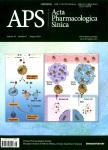Effect of curcumin on multidrug resistance in resistant human gastric carcinoma cell line SGC7901/VCR
Effect of curcumin on multidrug resistance in resistant human gastric carcinoma cell line SGC7901/VCR作者机构:Department of Physiology Nanhua University Hengyang China Department of Physiology Zhongshan Medical College Sun Yatsen University Guangzhou China Institute of Oncology Nanhua University Hengyang China
出 版 物:《Acta Pharmacologica Sinica》 (中国药理学报(英文版))
年 卷 期:2005年第26卷第8期
页 面:1009-1016页
核心收录:
学科分类:1002[医学-临床医学] 100214[医学-肿瘤学] 10[医学]
主 题:curcumin multidrug resistance apoptosis P-glycoprotein caspase-3
摘 要:Aim: To investigate the reversal effects of curcumin on multidrug resistance (MDR) in a resistant human gastric carcinoma cell line. Methods: The cytotoxic effect of vincristine (VCR) was evaluated by MTT assay. The cell apoptosis induced by VCR was determined by propidium iodide (PI)-stained flow cytometry (FCM) and a morphological assay using acridine orange (AO)/ethidium bromide (EB) dual staining. P-glycoprotein (P-gp) function was demonstrated by the accumulation and efflux of rhodamine 123 (Rh123) using FCM. The expression of P-gp and the activation of caspase-3 were measured by FCM using fluorescein isothiocyanate (FITC)-conjugated anti-P-gp and anti-cleaved caspase-3 antibodies, respectively. Results: Curcumin, at concentrations of 5 μmol/L, 10 μmol/L, or 20 μmol/L, had no cytotoxic effect on a parent human gastric carcinoma cell line (SGC7901) or its VCR-resistant variant cell line (SGC7901/VCR). The VCR-IC50value of the SGC7901/VCR cells was 45 times more than that of the SGC7901ceUs and the SGC7901/VCR cells showed apoptotic resistance to VCR. SGC7901/VCR cells treated with 5 μmol/L, 10μmol/L, or 20 μmol/L curcumin decreased the IC50value of VCR and promoted VCR-mediated apoptosis in a dose-dependent manner. Curcumin (10 μmol/L) increased Rh123 accumulation and inhibited the effiux of Rh123 in SGC7901/VCR cells, but did not change the accumulation and efflux of Rh123 in SGC7901 ceils. P-gp was overexpressed in SGC7901/VCR cells, whereas it was downregulated after a 24-h treatment with curcumin (10 μmol/L). Resistant cells treated with 1 μmol/L VCR alone showed 77% lower levels of caspase-3 activation relative to SGC7901 cells, but the activation of caspase-3 in the resistant cell line increased by 44% when cells were treated with VCR in combination with curcumin. Conclusion: Curcumin can reverse the MDR of the human gastric carcinoma SGC7901/VCR cell line. This might be associated with decreased P-gp function and expression, and the promotion of caspase-3



